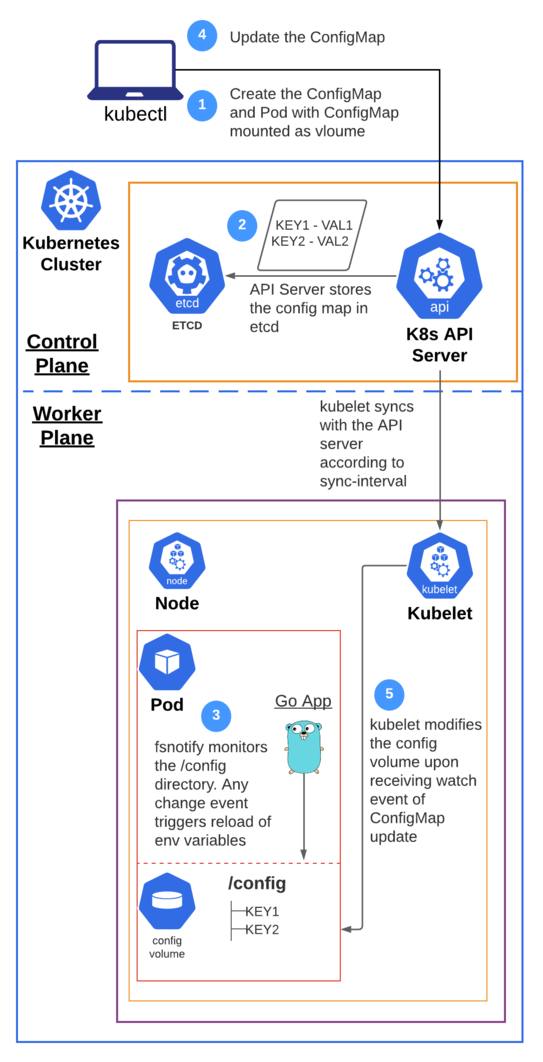It's a widely accepted practice to inject the environment variables into pods from ConfigMaps. This allows for more dynamic deployment of applications where the runtime properties need not be hardcoded into the application. Once the ConfigMap with the required key value pairs is created, all its entries can be used as environment variables for a pod. This can be configured as follows:
apiVersion: v1
kind: Pod
metadata:
name: env-test-pod
labels:
app: env-test
spec:
containers:
- name: env-test-container
image: itselavia/dynamic-update-env
envFrom:
- configMapRef:
name: env-vars
But, there are some use cases where the the environment variables needs to be modified and the application needs to react to those changes. This creates a bit of an operational issue because Kubernetes does not automatically restart the pod or updates its environment variables if a referenced ConfigMap is updated.
However, Kubernetes does update the volume mounts of the pod if the ConfigMap is mounted to the pod. So the basic idea is alongwith setting the environment variables using envFrom and configMapRef, we also mount the ConfigMap to the pod at a specific directory. This is configured as follows:
apiVersion: v1
kind: Pod
metadata:
name: env-test-pod
labels:
app: env-test
spec:
containers:
- name: env-test-container
image: itselavia/dynamic-update-env
envFrom:
- configMapRef:
name: env-vars
volumeMounts:
- mountPath: /config
name: env-volume
volumes:
- name: env-volume
configMap:
name: env-vars
We monitor the /config configuration directory for any changes. This example application uses fsnotify which is a golang library which implements filesystem monitoring for many platforms. We also need to reprogram the application to monitor the configuration directory in the background and update the environment variables in the pod when any change event is received. The Go code snippet is shared below:
func main() {
watcher, err := fsnotify.NewWatcher()
if err != nil {
fmt.Println("cannot initialize Watcher ", err)
}
defer watcher.Close()
// watcher will monitor the files in a background goroutine
go func() {
for {
select {
// reload the environment variables whenever changes are made in the /config directory
case _, ok := <-watcher.Events:
if !ok {
return
}
reloadEnvVars()
case err, ok := <-watcher.Errors:
if !ok {
fmt.Println("error from Watcher: ", err)
return
}
}
}
}()
// monitor the /config directory
err = watcher.Add("/config/")
if err != nil {
fmt.Println("error adding directory to Watcher", err)
}
}
The overall steps are depicted in the below diagram. The source code is available at this GitHub repository
 Flow Diagram for Dynamically Updating Environment Variables
Flow Diagram for Dynamically Updating Environment Variables
Demo
- Create a ConfigMap with environment variables KEY1=VAL1 and KEY2=VAL2
kubectl apply -f https://raw.githubusercontent.com/itselavia/dynamic-update-configmap-env-vars/main/configmap.yaml
kubectl apply -f https://raw.githubusercontent.com/itselavia/dynamic-update-configmap-env-vars/main/pod.yaml
kubectl apply -f https://raw.githubusercontent.com/itselavia/dynamic-update-configmap-env-vars/main/service.yaml
kubectl run curl-test --image=radial/busyboxplus:curl -i --tty --rm
curl http://env-svc:8080/getEnvValue?var=KEY1 VAL1
kubectl edit cm env-vars
apiVersion: v1
kind: ConfigMap
metadata:
name: env-vars
data:
KEY1: NEW_VAL1
KEY2: VAL2
curl http://env-svc:8080/getEnvValue?var=KEY1 NEW_VAL1
Note: The time period for synchronization between API server and Kubelet is set using the --sync-frequency parameter to kubelet config